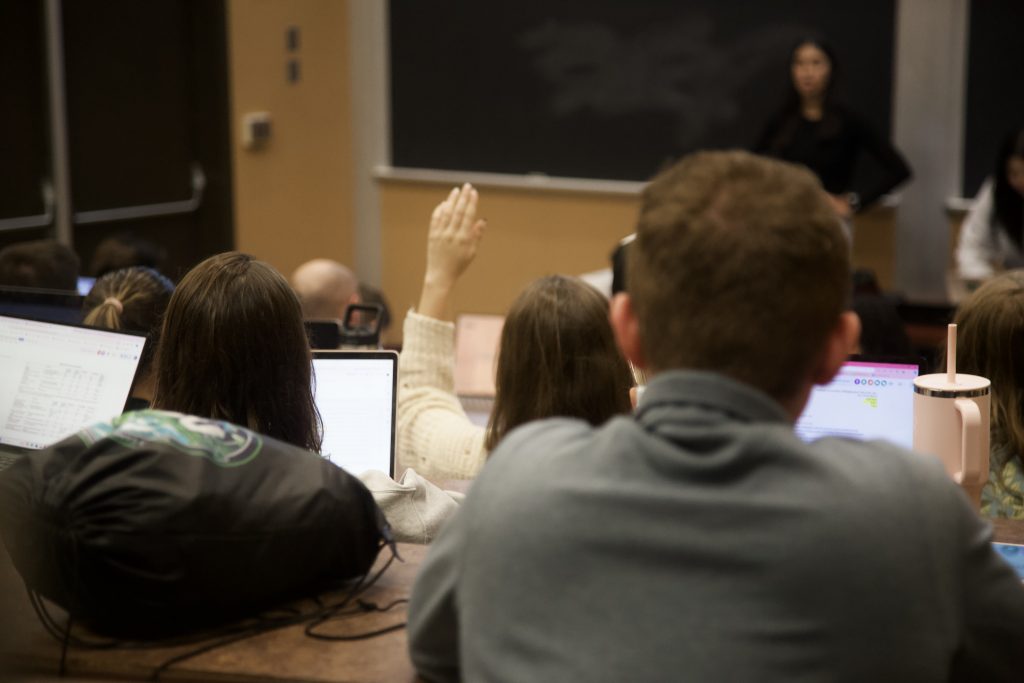This article was updated at 9:33 a.m. on 10/16.
Two resolutions passed by the Student Association Congress on Tuesday during a two-hour whirlwind meeting have been vetoed by the SA’s Executive Board.
Announced Monday morning, the E-Board rejected the resolution advocating the prohibition of “hoods, masks, and other facial coverings to conceal identity during lawful and unlawful assemblies or riots,” except for medical or religious reasons. They also vetoed the resolution rejecting unrecognized organizations, including Binghamton Solidarity for Palestine and SUNY BDS.
“Following the October 8th Congress meeting, we want to quell misinformation about the SA and let the student body know of actions taken by the Executive Board,” the E-Board wrote in an SA-Line sent to the campus community at 9:56 a.m.
Within 10 semester days, every piece of legislation the Congress passes must be reviewed by the Judicial Board, which can strike down individual sections or entire resolutions. In that case, the J-Board would issue a public statement, and they have yet to decide on the resolutions passed Tuesday.
In the statement, the E-Board said the goals of Resolution 4, which advocated for a ban on facial coverings during protests, except for medical and religious reasons, were contradictory to University policy, which does not designate a dress code. They added the resolution would “police students’ bodily autonomy.”
“This resolution would unnecessarily impact the everyday lives of students, and the Executive Board does not stand for restricting how students express themselves,” they wrote.
The legislation rejecting outside organizations like Binghamton Solidarity for Palestine, Resolution 6, said collaborating with a censured group could lead to de-chartering. It authorized the power to de-charter — which, according to the statement, has historically been held by the SA’s executive vice president — to the Judicial Board. The E-Board said this “oversteps the checks and balances put in place for our three branches of government.”
Saul Hakim, an off-campus representative and a senior advisor for the BU Zionist Organization double-majoring in Judaic studies and political science, who authored every resolution passed Tuesday, told Pipe Dream that he accepts the E-Board’s decision to veto Resolution 4 and will not motion to overturn it.
“While we believe that masking at protests harms the accountability and safety of the broader student body by obscuring identities, we recognize that this was a controversial resolution with valid concerns on both sides,” Hakim wrote. “We respect the systems of checks and balances in place, and understand why this veto was enacted, even though we stand by our position.”
Shortly after the mask-centered resolution was passed, the BU chapter of Young Democratic Socialists of America created a petition opposing the resolution. Monday afternoon, they posted a statement praising the vetoing of the two resolutions while advocating for three additional vetoes — of the amendment to a 2021 resolution, which they said “falsely associated antizionism with antisemitism,” the rescission of last year’s BDS resolution and Resolution 7, the legislation condemning divestment from Israel.
SJP wrote to Pipe Dream that though they agree with the SA E-Board’s decision to veto the legislation, they will not forgive the circumstances and measures taken to pass it.
“The Congress’s choice to push forward legislation that sought to ban masks during assemblies and silence unrecognized organizations like Binghamton Solidarity for Palestine and SUNY BDS was not only reckless — it was a blatant attack on student activism and marginalized communities,” they wrote.
Hakim emphasized that the board’s veto of R6 was of larger concern to him. Citing behavior he said was antisemitic, he added that their rhetoric disrupted the campus climate, creating a divisive atmosphere. Hakim said he offered to amend some of their concerns in a “mutually agreeable” way at a recent meeting with the E-Board. On Tuesday, following their meeting, the E-Board informed him they would be upholding the veto under the initial justifications, according to Hakim. He mentioned that although they will explore all options, motioning to override the veto of Resolution 6 is a possibility.
“Binghamton Solidarity for Palestine smiles upon the decision to veto these resolutions,” the group wrote in a statement to Pipe Dream. “The zionist SA’s attempts to silence our organization by threatening groups who collaborate with us and their attacks on the safety and well-being of protest-goers should alarm proponents of free speech on our campus.”
To overturn the vetoes, a 75 percent supermajority of Congress is needed. Hakim said the vetoes will not be recorded until the next Congress meeting on Nov. 12.
“Let us be clear: these groups must not be allowed to operate unchecked on our campus,” Hakim wrote. “Their hateful, discriminatory, rhetoric is not only antisemitic but endangers the well-being of the broader student body.”



